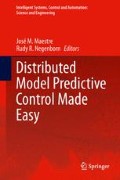Abstract
Despite of the efforts dedicated to design methods for distributed model predictive control (DMPC), the cooperation among subsystems still remains as an open research problem. In order to overcome this issue, game theory arises as an alternative to formulate and characterize the DMPC problem. Game theory is a branch of applied mathematics used to capture the behavior of the players (agents or subsystems) involved in strategic situations where the outcome of a player is function not only of his choices but also depends on the choices of others. In this chapter a bargaining game based DMPC scheme is proposed; roughly speaking, a bargaining game is a situation where several players jointly decide which strategy is best with respect to their mutual benefit. This allows to deal with the cooperation issues of the DMPC problem. Additionally, the bargaining game framework allows to formulate solutions where the subsystems do not have to solve more than one optimization at each time step. This also reduces the computational burden of the local optimization problems.
Access this chapter
Tax calculation will be finalised at checkout
Purchases are for personal use only
References
O. Akira. A noncooperative approach to general N-person cooperative games. Discussion Papers 2005–01, Graduate School of Economics, Hitotsubashi University, 2005
I. Alvarado, D. Limon, D. Munoz de la Pena, J.M. Maestre, R.R. Negenborn, F. Valencia, H. Scheu, M.A. Ridao, B. De Schutter, J. Espinosa, and W. Marquardt. A comparative analysis of distributed [mpc] techniques applied to the [hd-mpc] four-tank benchmark. J. Process Control 21, 800–815 2010
A.M. Brandenburger, B.J. Nalebuff, The Right Game: Use the Game Theory to Shape Strategy (Harvard Bussines Review, July-August, 1995)
E. Camponogara, D. Jia, B.H. Krogh, S. Talukdar, Distributed model predictive control. IEEE Control Syst. Mag. 22(1), 44–52 (2002)
D. Doan, T. Keviczky, I. Necoara, and M. Diehl. A Jacobi algorithm for distributed model predictive control of dynamically coupled systems. Technical Report arXiv:0809.3647, Delf University of Technology, Sep 2008. Comments: Shorter version submitted to 2009 American Control Conference
D. Jia and B.H. Krogh. Distributed Model Predictive Control. Proceedings of the 2001 American Control Conference, pages 2767–2772, 2001
J. M. Maestre, D. Muñoz de la Peña, and E. F. Camacho. Distributed MPC Based on a Cooperative Game. 48th IEEE Conference on Decision and Control and 28th Chinese Control Conference, 2009
R.B. Myerson. Game Theory: Analysis of Conflict. Harvard University Press, 1991
J. Nash, Two-person cooperative games. Econometrica 21(1), 128–140 (1953)
I. Necoara, D. Doan, and J.A.K. Suykens. Application of the proximal center decomposition method to distributed model predictive control. Proceedings of the 2008 IEEE Conference on Decision and, Control, pp. 2900–2905, 2008
H.J. Peters, Axiomatic Bargaining Game Theory (Kluwer Academic Publishers, Dordrecht, 1992)
C. Roviro, F. Valencia, J.D. López, J.J. Espinosa, A. Nú nez, and B. De Schutter. Non linear model predictive control based on game theory for traffic control on highways. In IFAC Conference on Nonlinear Model Predictive, Control, 2012
P.A. Trodden, D. Nicholson, and A.G. Richards. Distributed model predictive control as a game with coupled contraints. Proceedings of the European Control Conference, 2009
F. Valencia. Game Theory Based Distributed Model Predictive Control: An Approach to Large-Scale Systems Control. Ph.D thesis, Facultad de Minas, 2012
F. Valencia, J. Espinosa, B. De Schutter, and K. Stavnková. Feasible-cooperation distributed model predictive control scheme based on game theory. In 18th IFAC world congress, 2010
A.N. Venkat, J.B. Rawlings, and S.J. Wright. Stability and optimality of distributed, linear model predictive control. Part I: State feedback. Texas-Wisconsin Modeling and Control Consortium Technical, Report, 3, 2006
Acknowledgments
This research has been supported by the European 7th framework STREP project “Hierarchical and distributed model predictive control (HD-MPC)”, contract number INFSO-ICT-223854.
Author information
Authors and Affiliations
Corresponding author
Editor information
Editors and Affiliations
Rights and permissions
Copyright information
© 2014 Springer Science+Business Media Dordrecht
About this chapter
Cite this chapter
Valencia, F., López, J.D., Patiño, J.A., Espinosa, J.J. (2014). Bargaining Game Based Distributed MPC. In: Maestre, J., Negenborn, R. (eds) Distributed Model Predictive Control Made Easy. Intelligent Systems, Control and Automation: Science and Engineering, vol 69. Springer, Dordrecht. https://doi.org/10.1007/978-94-007-7006-5_2
Download citation
DOI: https://doi.org/10.1007/978-94-007-7006-5_2
Published:
Publisher Name: Springer, Dordrecht
Print ISBN: 978-94-007-7005-8
Online ISBN: 978-94-007-7006-5
eBook Packages: EngineeringEngineering (R0)

